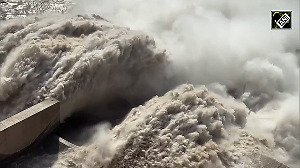 As the April 1, 2010 deadline nears for introducing Bharat Stage-IV emission-compliant vehicles, manufacturers are worried about the availability of the BS-III fuel.
As the April 1, 2010 deadline nears for introducing Bharat Stage-IV emission-compliant vehicles, manufacturers are worried about the availability of the BS-III fuel.
However, add the experts, there is no problem in running an older car, say, with a BS-II or BS-I complaint-engine, on BS-IV or any other superior-quality fuel. The problem is for the BS-IV vehicles running on inferior-quality fuel, not the other way round.
If a new BS IV-run vehicle, to be mandatorily sold from April 1 across 13 cities, is driven on BS-II fuel, then the high sulphur content and low octane levels present in the older fuel will drastically hit the vehicle's overall performance in terms of pick-up, fuel efficiency and refinement.
From April 1, petrol pumps in these 13 cities - the National Capital Region, Mumbai, Hyderabad, Kolkata, Chennai, Bangalore, Ahmedabad, Pune, Surat, Kanpur and Agra - are to only sell BS-IV fuel, while the rest of the country will be upgraded to BS-III from BS-II currently.
A senior executive from the Society of Indian Automobile Manufacturers (Siam) said, "We have a particular concern about the unavailability of the correct fuel from April 1. The current range of engines is tuned in such a way that they can handle both types of fuels (BS-II and BS-III).
The next generation engine, of BS-IV, will be more tuned to handle BS-III than BS-II. If there is a sustained mismatch in fuel quality for about a month, then there will definitely be a very negative impact on performance. Most likely, there would be a knocking tendency while acceleration, much reduced fuel efficiency levels and a long-term impact on the life of the vehicle."
This would happen because the new vehicles cannot run on fuel which has a higher sulphur content as in BS-II. The sulphur content in BS-IV is 50, in the relevant unit of measurement, whereas in BS-II it is 500, while in BS-III, it is 150. Similarly, if the car is tuned to run on a minimum octane level of 91 (such as in BS-IV), it will have difficulty in running at 88 (such as in BS-II).
In addition, the life of the catalytic converter, which helps reduce harmful emissions, will be reduced. This means that if the converter is tuned to last for 80,000 km, its shelf life will be depleted much before that.
Further, many vehicles will now come with an onboard diagnostics (OBD) system, which essentially helps the owner or technician access the state of health for various sub-systems. This system will repeatedly trigger an alarm if inferior fuel enters the vehicle.
"It is a little difficult to say how fast the vehicle will get impacted. It can be a single month's usage of BS-II fuel, a couple of tanks full of BS-II fuel or it will also depend on the driving habits of the driver. The immediate impact will be on noble metals and also on the catalytic converter," said the Siam official
"It is not possible for many companies, including Maruti Suzuki, to roll back their plans because you need to order suitable component volumes well in advance. Even component makers need time to adjust to the new regime," said a senior executive at Maruti Suzuki, the country's top vehicle producer.
Rajan Wadhera, Mahindra & Mahindra's chief of engineering and development, said: "The new engines will not be able to run efficiently on lower grade fuel. This will impact the durability and performance of the engine and the vehicle in a big way."








 © 2025
© 2025